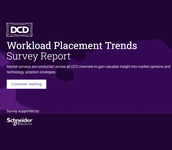Emerson Electric has won another chance to argue against allegations it stole trade secrets from UK company BladeRoom to build a data center for Facebook, as the six-year-old dispute returns to court once more in the US.
In 2018, a jury trial in California found that Emerson Electric had used trade secrets stolen from BladeRoom, to build Facebook's data center in Luleå, Sweden, back in 2011. The case alleged that Emerson and Facebook had conspired to steal the ideas for "flatpacked" modular construction, to build Facebook's flagship European data center - but Facebook settled out of court in 2018. Emerson's legal bill has been climbing, with district Judge Edward J. Davila ruling it should pay interest and legal costs, taking the current figure to $77 million.
Now, the 9th US Circuit Court of Appeals has "vacated" that ruling, finding that the court had misread a non-disclosure agreement between BladeRoom and Emerson, preventing the company from making its best defense.
Here we go again
The current verdict is a "legally unjustified windfall to BladeRoom and a miscarriage of justice," said US District Judge Stephen Murphy, presenting the unanimous verdict of a three-judge panel. The case must now come back to court.
Emerson's attorney Carter Phillips of Sidley Austin welcomed the decision, saying that Judge Davila's decision "took away from the jury's consideration the heart of Emerson's defense," according to a Reuters report.
The original lawsuit began in 2015, when BladeRoom claimed that it had shown Facebook its designs for modular data centers in 2011, and these eventually reappeared as part of the Rapid Deployment Data Center (RDDC) design which Facebook and Emerson used to build the Luleå data center, and then shared through the Open Compute Project's project of open source hardware for hyperscale data centers.
The trial heard that Emerson discussed the possibility of Emerson buying BladeRoom in 2011, and the two companies signed an NDA under which their confidentiality obligations would survive "the termination of any discussions or negotiations ... provided that this agreement shall terminate on the date two years from the date hereof."
This acquisition deal fell through, and both comapnies pitched to help build the Luleå site. Facebook chose Emerson's design, and BladeRoom sued both companies.
Facebook settled with BladeRoom in 2018 for an unknown sum - reportedly in a bid to limit ongoing litigation when the company was embroiled in the Cambridge Analytica scandal and CEO Mark Zuckerberg was due to appear before the Senate.
Emerson went to court, and the jury found against it. BladeRom was awarded $30 million in damages, with Judge Davila adding $30 million in punitive damages, and $17.4 million in prejudgment interest, as well as $18.5 million in attorneys' fees.
Since then, Emerson has argued that the NDA had expired before Emerson signed its contract with Facebook, but it was unable to put this to the jury because Davila barred it, based on his interpretation of the NDA.
Now Judge Murphy says the quoted agreement clause "unambiguously terminated the NDA and its confidentiality obligations two years after it was signed."
BladeRoom had argued that the clause only referred to the companies' "discussions or negotiations," not Emerson's confidentiality obligations, but Murphy said this "not only twisted the ordinary meaning of words, but it also spawned absurdity."
Murphy said: "If, for example, either party stopped negotiating within two years, then the party would have breached the NDA," Murphy said. "Similarly, if the parties kept negotiating after two years, then both parties would have breached the NDA."
The re-trial does not mean that Emerson has won. It simply implies that there is no way to know what verdict the jury would have returned if Emerson had been allowed to present its interpretation of the NDA.
The 9th Circuit knocked out the jury awards because there was "no way to know" if it would have returned the same verdict "if the district court had allowed Emerson to present its chief defense."
The case now awaits a new trial. All these details are given in a 37-page document here.
The defendant in the trial is Emerson Electric, Emerson Network Power, and Liebert. Although ENP and Liebert were sold off and became Vertiv, Vertiv is not part of the suit.
BladeRoom partners
BladeRoom's Twitter feed and site mention partners in multiple countries, including a US subsidiary.BladeRoom US, set up with TMI Climate Solutions. The BladeRoom US site claims BladeRoom has 80 data centers live in four continents, offering PUE figures for seven facilities in North America. TMI's site makes no mention of BladeRoom, that DCD could find, however.
Elsewhere, BladeRoom has provided technology for three separate phases at Rack Centre in Lagos, Nigeria - whose manager Sunday Opadijo mentioned the company to DCD in 2019. The most recent phase opened in July 2021
In the UK, BladeRoom has provided technology for Ark Data Centres, where a 2019 blog makes mention of the partnership. "We are a British company who like to deploy British manufactured cooling systems from companies such as BladeRoom and ExCool," said sales and marketing director Ray Gibbens. Ark's use of BladeRoom is also called out in other recent media.
In Australia, BladeRoom provided technology for Metronode, which was bought by Equinix in 2017. At the time, analyst Jabez Tan reportedly predicted that "Equinix will likely use the BladeRoom modules to support existing customer contracts and expansions” but would go back to its typical data center design for new deployments, according to Data Center Knowledge.
DCD has contacted BladeRoom and others involved, with no comments returned as yet.



